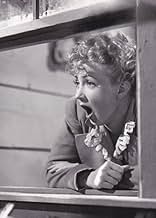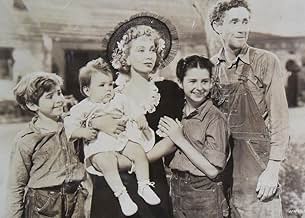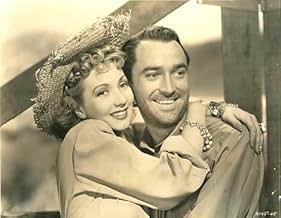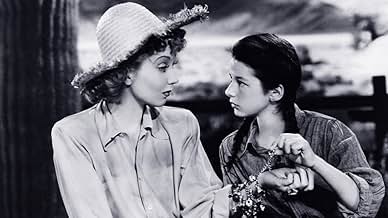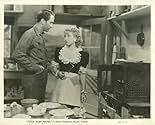CALIFICACIÓN DE IMDb
6.2/10
487
TU CALIFICACIÓN
Agrega una trama en tu idiomaMaisie Ravier finds herself stranded in an Arizona ghost town with a family of migrant dust bowl refugees. The ghost town, it turns out, may have a gold mine.Maisie Ravier finds herself stranded in an Arizona ghost town with a family of migrant dust bowl refugees. The ghost town, it turns out, may have a gold mine.Maisie Ravier finds herself stranded in an Arizona ghost town with a family of migrant dust bowl refugees. The ghost town, it turns out, may have a gold mine.
- Dirección
- Guionistas
- Elenco
- Premios
- 1 premio ganado en total
Victor Kilian Jr.
- Ned Sullivan
- (as Victor Killian Jr.)
Dorothy Appleby
- Hatcheck Girl
- (sin créditos)
Jessie Arnold
- Wife of Prospector Hearing About Free Land
- (sin créditos)
- Dirección
- Guionistas
- Todo el elenco y el equipo
- Producción, taquilla y más en IMDbPro
Opiniones destacadas
The Quick Pitch: On her way to a gig in Phoenix, Maisie's car breaks down in the middle of the desert. She finds herself stranded in an old mining town. When gold is rediscovered, Maisie helps a dirt poor family in their attempt to strike it rich.
I've got to agree with what a lot of others have written on the internet - Gold Rush Maisie definitely has a Grapes of Wrath feel to it. For me, that's one of the films biggest flaws. I enjoy these Maisie films for their comedy and ridiculousness. And while Ann Sothern gets in a good one-liner here and there, the overall tone is terribly somber. When you're dealing with dirt farmers who have no idea where their next meal is going to come from, laughing at Maisie's hijinks just doesn't feel right. Gold Rush Maisie wasn't the kind of entertainment I was expecting or looking for.
My other big complaint is with the ranch owner, Bill Anders, played by Lee Bowman. My problem Isn't with Bowman (in fact, there's something about him that I like more than any of the other male leads Southern played opposite in the first three Maisie films). Instead, my problem is with the character, Lee Anders. One minute, he's in love with Maisie - the next, he can't stand her. One minute, he wants to help the farmers - the next, he wants to throw them off his land. The wild swings the character goes through make no sense at all. It's a pretty poor job of writing.
So far, all I've talked about are the negatives. Based on my rating, it should be obvious that I didn't find Gold Rush Maisie a total wash-out. When the script allows Maisie to be Maisie, those moments really shine. Southern is such a joy to watch as Maisie with her perfect comedic timing and infectious nature. Maisie is always a treat.
5/10
I've got to agree with what a lot of others have written on the internet - Gold Rush Maisie definitely has a Grapes of Wrath feel to it. For me, that's one of the films biggest flaws. I enjoy these Maisie films for their comedy and ridiculousness. And while Ann Sothern gets in a good one-liner here and there, the overall tone is terribly somber. When you're dealing with dirt farmers who have no idea where their next meal is going to come from, laughing at Maisie's hijinks just doesn't feel right. Gold Rush Maisie wasn't the kind of entertainment I was expecting or looking for.
My other big complaint is with the ranch owner, Bill Anders, played by Lee Bowman. My problem Isn't with Bowman (in fact, there's something about him that I like more than any of the other male leads Southern played opposite in the first three Maisie films). Instead, my problem is with the character, Lee Anders. One minute, he's in love with Maisie - the next, he can't stand her. One minute, he wants to help the farmers - the next, he wants to throw them off his land. The wild swings the character goes through make no sense at all. It's a pretty poor job of writing.
So far, all I've talked about are the negatives. Based on my rating, it should be obvious that I didn't find Gold Rush Maisie a total wash-out. When the script allows Maisie to be Maisie, those moments really shine. Southern is such a joy to watch as Maisie with her perfect comedic timing and infectious nature. Maisie is always a treat.
5/10
The movie may not have done much for comedic Maisie, but it' a worthy reflection of Depression era straits. I like the way Maisie's slowly drawn into the Davis family plight. They're a hard-scrabble family who've lost their farm, along with thousands of others, and are now living hand to mouth. The city-bred Maisie meets up with them as they along with other dispossessed farmers are traveling as part of a rumored gold rush. Though separated at first by a cultural contrast, Maisie's drawn into the family by the common humanity their plight represents, especially by winning little Jubie Davis (Weidler). Together, they share their meager money, along with hopes of a gold strike that will lift their fortunes.
Though MGM has hired a big crowd of extras and costumed them in appropriately seedy clothes, Maisie still stands out. But what about those tacky exteriors that fairly shout studio sound stage. Why make the costuming so realistic, then background them with such outdoor phoniness. After all, this is MGM. At times, Sothern's a little shrill for my taste, but manages to remain likable, while actor Bowman as the reluctant benefactor makes for a churlish and unusual leading man. Too bad little Weidler is largely forgotten. She made for a charmingly plain-faced youngster, without being cutesy. Anyway, the overall result is a curious combination of Depression era drama and Maisie type spunk minus the series' usual laughs. So, fans of the series may find this entry too pointed for their liking. But I enjoyed it for its strong moral and as a reflection of the desperate times.
(In passing-- My dad owned a Colorado gold mine many years ago, and I remember as a boy how eagerly he awaited assay office results so he would know where next to tunnel. In fact, with a few notable exceptions gold in its natural state is unrecognizable. Instead, it's blended into ore that must then be tested for its gold content. So the movie's element of suspense is not fictional.)
Though MGM has hired a big crowd of extras and costumed them in appropriately seedy clothes, Maisie still stands out. But what about those tacky exteriors that fairly shout studio sound stage. Why make the costuming so realistic, then background them with such outdoor phoniness. After all, this is MGM. At times, Sothern's a little shrill for my taste, but manages to remain likable, while actor Bowman as the reluctant benefactor makes for a churlish and unusual leading man. Too bad little Weidler is largely forgotten. She made for a charmingly plain-faced youngster, without being cutesy. Anyway, the overall result is a curious combination of Depression era drama and Maisie type spunk minus the series' usual laughs. So, fans of the series may find this entry too pointed for their liking. But I enjoyed it for its strong moral and as a reflection of the desperate times.
(In passing-- My dad owned a Colorado gold mine many years ago, and I remember as a boy how eagerly he awaited assay office results so he would know where next to tunnel. In fact, with a few notable exceptions gold in its natural state is unrecognizable. Instead, it's blended into ore that must then be tested for its gold content. So the movie's element of suspense is not fictional.)
"Gold Rush Maisie" has Maisie (Ann Sothern) prospecting in this 1940 entry into the series.
Maisie's car breaks down, and she becomes stranded and has to ask for help from an isolated, nasty rancher (Lee Bowman) who shares his house with another sourpuss (Slim Somerville).
These films all followed the same formula - Maisie's charm, no-nonsense attitude and warmth melt the icebergs she meets. Later on, she meets a family of farmers who have lost their farm and become migrant workers.
Now they're on their way to prospect for gold. Maisie is stunned at how little they have and sets out to help them.
The atmosphere of "Gold Rush Maisie" is a little more down than usual, and the actions of the rancher played by Lee Bowman are inexplicable. First he's nasty, then he abruptly puts the moves on Maisie, becomes nasty again, and later, after she tells him off, he becomes nice.
Bowman was Sothern's leading man in the series more than once, as was James Craig - I prefer James Craig, who had more energy and variety in his acting.
One does really feel for the family, and that helps to hold one's interest. Sothern does her usual bang-up job.
Another reviewer has it right - Sothern would have been a bigger star in an earlier era. But if huge movie stardom eluded her, she still played some wonderful roles, and her two series are a treasure, as is the actress herself.
Maisie's car breaks down, and she becomes stranded and has to ask for help from an isolated, nasty rancher (Lee Bowman) who shares his house with another sourpuss (Slim Somerville).
These films all followed the same formula - Maisie's charm, no-nonsense attitude and warmth melt the icebergs she meets. Later on, she meets a family of farmers who have lost their farm and become migrant workers.
Now they're on their way to prospect for gold. Maisie is stunned at how little they have and sets out to help them.
The atmosphere of "Gold Rush Maisie" is a little more down than usual, and the actions of the rancher played by Lee Bowman are inexplicable. First he's nasty, then he abruptly puts the moves on Maisie, becomes nasty again, and later, after she tells him off, he becomes nice.
Bowman was Sothern's leading man in the series more than once, as was James Craig - I prefer James Craig, who had more energy and variety in his acting.
One does really feel for the family, and that helps to hold one's interest. Sothern does her usual bang-up job.
Another reviewer has it right - Sothern would have been a bigger star in an earlier era. But if huge movie stardom eluded her, she still played some wonderful roles, and her two series are a treasure, as is the actress herself.
Back in the old big studio days MGM didn't send their expensive cast and crews out on location if they could possibly keep them back home on the Culver City lot, especially if the story was set in the Arizona desert as this one is. This 1940 studio-bound production is a curiosity: full of phony sound-stage sets pretending to be exteriors, obvious painted backdrops and fuzzy process shots. Ann Southern and Virginia Weilder even have a big sister-little sister talk while walking on a treadmill as a process-shot desert background is projected in the background. No production shot today could get away with all this fakery. On the plus side, the good-hearted screenplay co-written by Mary C. McCall, Jr, president of the Screen Writer's Guild, is one of the few scripts, other than "The Grapes of Wrath," to have dealt sympathetically with the plight of Dust-bowl farm families who moved west in search of a better life.
Showgirl Maisie Ravier (Ann Sothern) gets stranded after her rundown car breaks down. She is forced to stay with local dirt farmer Bill Anders and his help Fred Gubbins. He claims the abandoned town nearby is haunted by ghosts. She heads off to the next town to find work and is told about the ghost town with gold. She joins the Depression era Davis family on their search for the gold.
I like the Maisie character after watching the first three movies. There is no need to overplay her jokes. The termite driving a beer truck joke is fine but there is no need to point and laugh. It steps on the joke. What I like most is that she is the lead of her own franchise. She is finally not defined by her romantic male lead. I like that she is the hero of that downtrodden family. The writing is a bit clunky like her $25 car but it still has its fun.
I like the Maisie character after watching the first three movies. There is no need to overplay her jokes. The termite driving a beer truck joke is fine but there is no need to point and laugh. It steps on the joke. What I like most is that she is the lead of her own franchise. She is finally not defined by her romantic male lead. I like that she is the hero of that downtrodden family. The writing is a bit clunky like her $25 car but it still has its fun.
¿Sabías que…?
- TriviaThe third of ten movies starring Ann Sothern as the heroine Maisie Ravier released by MGM from 1939 to 1947.
- ErroresEarly in the movie when Maisie is frightened and gives out a yell; she gets a loud echo. The only mountains in the area are far off in the distance. There is nothing in the area that would cause an echo.
- Citas
Maisie Ravier: Every man knows somethin' about a car.
- ConexionesFeatured in 100 Years of Comedy (1997)
Selecciones populares
Inicia sesión para calificar y agrega a la lista de videos para obtener recomendaciones personalizadas
Detalles
- Tiempo de ejecución1 hora 22 minutos
- Color
- Relación de aspecto
- 1.37 : 1
Contribuir a esta página
Sugiere una edición o agrega el contenido que falta

Principales brechas de datos
By what name was La dorada ilusión (1940) officially released in India in English?
Responda
